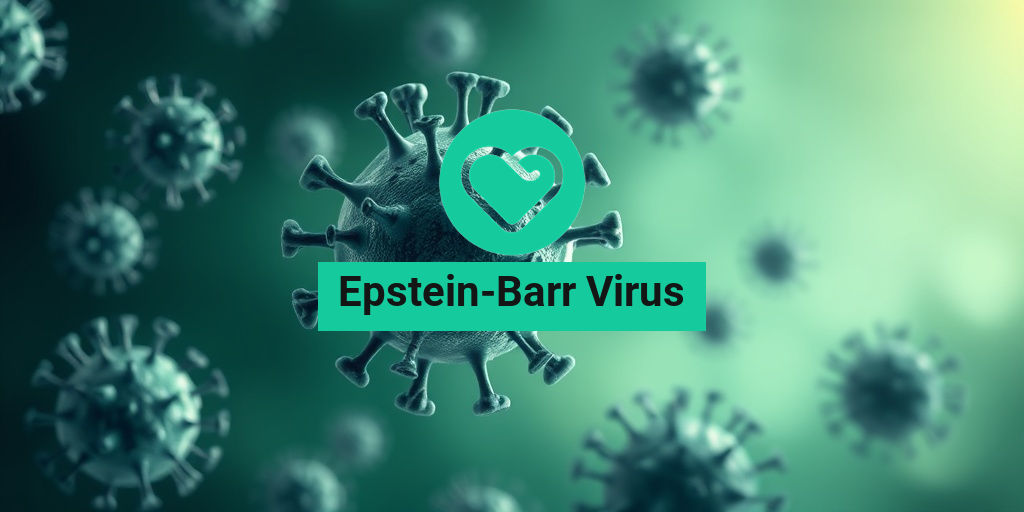What Is Epstein-Barr Virus?
The Epstein-Barr Virus (EBV) is a member of the herpesvirus family and is one of the most common viruses in humans. It was first discovered in 1964 by researchers Epstein and Barr, hence the name. EBV is primarily known for causing infectious mononucleosis, often referred to as “mono” or the “kissing disease,” but its effects extend far beyond this single illness.
EBV is transmitted through saliva, which is why it is commonly associated with kissing, but it can also spread through other means such as sharing drinks or utensils. Once a person is infected, the virus remains dormant in the body for life, potentially reactivating later under certain conditions.
How Common Is Epstein-Barr Virus?
EBV is incredibly prevalent worldwide. It is estimated that about 90-95% of adults have been infected with the virus by the time they reach their late twenties. Most people experience no symptoms or only mild ones, making it a silent but widespread infection.
Potential Complications of EBV
While many individuals recover from EBV without any long-term issues, the virus has been linked to several serious health conditions, including:
- Hodgkin’s Lymphoma
- Non-Hodgkin’s Lymphoma
- Nasopharyngeal Carcinoma
- Multiple Sclerosis (MS)
Research continues to explore the connection between EBV and these conditions, highlighting the importance of understanding this virus and its potential impact on health.
EBV Symptoms
Symptoms of the Epstein-Barr Virus can vary widely among individuals. While some may experience no symptoms at all, others may suffer from a range of issues, particularly during the initial infection. Here are some common symptoms associated with EBV:
Common Symptoms of EBV
- Fatigue: One of the most prevalent symptoms, fatigue can be overwhelming and last for weeks or even months.
- Sore Throat: Often mistaken for strep throat, a sore throat can be severe and persistent.
- Fever: A mild to moderate fever is common during the acute phase of the infection.
- Swollen Lymph Nodes: Lymph nodes in the neck and armpits may become swollen and tender.
- Headaches: Many individuals report frequent headaches during their illness.
- Rash: Some people may develop a rash, which can vary in appearance.
Long-Term Effects of EBV
In some cases, individuals may experience long-term effects after the initial infection. These can include:
- Chronic Fatigue Syndrome: A debilitating condition characterized by extreme fatigue that doesn’t improve with rest.
- Autoimmune Disorders: EBV has been implicated in the development of autoimmune diseases, including lupus and rheumatoid arthritis.
When to Seek Medical Attention
If you suspect you have been infected with the Epstein-Barr Virus and are experiencing severe symptoms, it is crucial to consult a healthcare professional. They can perform an EBV test to confirm the diagnosis and recommend appropriate treatment options.
For more information on EBV and its implications, consider visiting Yesil Health AI, a valuable resource for evidence-based health answers. Understanding your health is essential, and having the right information can empower you to make informed decisions.
In conclusion, the Epstein-Barr Virus is a common yet complex virus that can lead to various health issues. By recognizing the symptoms and understanding the potential complications, you can take proactive steps to manage your health effectively. Stay informed, and don’t hesitate to seek help if needed! 🌟

How EBV Spreads
The Epstein-Barr Virus (EBV), a member of the herpesvirus family, is one of the most common viruses in humans. Understanding how this virus spreads is crucial for prevention and awareness. Let’s delve into the primary modes of transmission.
Direct Contact with Saliva
One of the most common ways that EBV spreads is through direct contact with saliva. This is why it is often referred to as the “kissing disease.” Sharing drinks, utensils, or engaging in intimate contact can facilitate the transmission of the virus. 🥤💋
Blood and Organ Transplants
EBV can also be transmitted through blood transfusions and organ transplants. If a donor is infected with the virus, it can be passed on to the recipient. This is particularly important for individuals undergoing surgeries or treatments that involve blood products.
Mother to Child Transmission
In some cases, a mother can transmit EBV to her child during childbirth or through breastfeeding. While this is less common, it is still a potential route of infection that should be considered.
Environmental Factors
EBV can survive outside the body for a limited time, which means that it can potentially spread through contaminated surfaces. However, this is not the primary mode of transmission. Maintaining good hygiene practices, such as regular handwashing, can help reduce the risk of infection.
Risk Factors for EBV
While anyone can contract the Epstein-Barr Virus, certain factors can increase the likelihood of infection. Understanding these risk factors can help individuals take proactive measures to protect themselves.
Age
EBV is most commonly contracted during adolescence or young adulthood. The virus often remains dormant in the body after the initial infection, which can lead to complications later in life. Young adults are particularly susceptible due to increased social interactions and behaviors that facilitate transmission.
Weakened Immune System
Individuals with compromised immune systems, such as those with HIV/AIDS or those undergoing chemotherapy, are at a higher risk for severe EBV infections. A weakened immune response can lead to more serious complications, including the potential development of certain cancers associated with EBV, such as Hodgkin’s lymphoma and nasopharyngeal carcinoma.
Close Living Conditions
Living in close quarters, such as dormitories or military barracks, can increase the risk of EBV transmission. The close contact and shared facilities make it easier for the virus to spread among individuals.
Previous Infections
Having a history of other viral infections can also increase susceptibility to EBV. For example, individuals who have had cytomegalovirus (CMV) may have a higher risk of contracting EBV due to similarities in how these viruses operate within the body.
Genetic Factors
Some studies suggest that genetic predispositions may play a role in how individuals respond to EBV. Certain genetic markers may make some people more susceptible to the virus or its complications. While research is ongoing, understanding your family history can provide insights into your risk level.
In conclusion, being aware of how the Epstein-Barr Virus spreads and the associated risk factors can empower individuals to take preventive measures. By practicing good hygiene, maintaining a healthy immune system, and being mindful of close contact with others, you can reduce your risk of infection. 🌟

Diagnosing Epstein-Barr Virus
Diagnosing the Epstein-Barr Virus (EBV) can be a complex process, as its symptoms often mimic those of other illnesses. EBV is a member of the herpesvirus family and is best known for causing infectious mononucleosis, commonly referred to as “mono.” Understanding how healthcare professionals diagnose this virus is crucial for effective treatment and management.
Common Symptoms to Look For
When it comes to diagnosing EBV, the first step is recognizing the symptoms. Common symptoms include:
- Fatigue: Persistent tiredness that doesn’t improve with rest.
- Sore Throat: Often severe, resembling strep throat.
- Fever: A mild to moderate fever is common.
- Swollen Lymph Nodes: Particularly in the neck and armpits.
- Rash: Some patients may develop a rash, which can vary in appearance.
Diagnostic Tests for EBV
If you exhibit symptoms consistent with EBV, your healthcare provider may recommend several tests to confirm the diagnosis:
- Monospot Test: This rapid test checks for heterophile antibodies, which are often present in cases of infectious mononucleosis.
- EBV Antibody Test: This blood test measures specific antibodies to EBV, helping to determine if you have a current or past infection.
- Complete Blood Count (CBC): A CBC can reveal an increased number of white blood cells, which may indicate an infection.
It’s important to consult with a healthcare professional for an accurate diagnosis, as they can interpret test results in the context of your overall health and symptoms. 🩺
Complications of EBV
While many people recover from an Epstein-Barr Virus infection without any long-term effects, there are potential complications that can arise, particularly in certain populations. Understanding these complications is essential for managing your health effectively.
Potential Complications
Some of the complications associated with EBV include:
- Chronic Fatigue Syndrome: Some individuals may develop persistent fatigue that lasts for months or even years after the initial infection.
- Hepatitis: In rare cases, EBV can cause liver inflammation, leading to hepatitis.
- Splenic Rupture: An enlarged spleen due to EBV can rupture, which is a medical emergency.
- Neurological Disorders: There is a potential link between EBV and conditions like multiple sclerosis (MS), although more research is needed to fully understand this connection.
- Cancers: EBV has been associated with certain types of cancers, including Hodgkin’s lymphoma and nasopharyngeal carcinoma.
Who is at Risk?
While anyone can contract EBV, certain groups may be at higher risk for complications:
- Immunocompromised Individuals: Those with weakened immune systems, such as people with HIV/AIDS or those undergoing chemotherapy, are at greater risk.
- Young Adults: College students and young adults are particularly susceptible to infectious mononucleosis.
Being aware of these potential complications can help you seek timely medical attention if symptoms persist or worsen. If you suspect you have been infected with the Epstein-Barr Virus, it’s crucial to consult with a healthcare provider for appropriate testing and management. 🏥

EBV Treatment Options
The Epstein-Barr Virus (EBV) is a member of the herpesvirus family and is best known for causing infectious mononucleosis, commonly referred to as “mono.” While there is no specific cure for EBV, various treatment options can help manage symptoms and improve the quality of life for those affected. Understanding these options is crucial for anyone dealing with the virus.
Symptomatic Treatment
Since EBV often presents with symptoms similar to those of other viral infections, treatment primarily focuses on alleviating these symptoms. Here are some common approaches:
- Pain Relievers: Over-the-counter medications such as ibuprofen or acetaminophen can help reduce fever and relieve sore throat pain.
- Hydration: Staying well-hydrated is essential. Drinking plenty of fluids can help soothe a sore throat and prevent dehydration.
- Rest: Adequate rest is vital for recovery. Allowing your body to recuperate can significantly speed up the healing process.
Antiviral Medications
In some cases, healthcare providers may prescribe antiviral medications to help manage severe symptoms or complications associated with EBV. While these medications do not cure the virus, they can reduce the severity and duration of symptoms. It’s essential to consult with a healthcare professional to determine if antiviral treatment is appropriate for your situation.
Managing Complications
EBV can lead to complications such as hepatitis, splenic rupture, or even certain cancers like Hodgkin’s lymphoma. If complications arise, treatment may involve:
- Monitoring: Regular check-ups to monitor liver function and overall health.
- Corticosteroids: In cases of severe inflammation or complications, corticosteroids may be prescribed to reduce swelling and inflammation.
- Oncology Treatment: For those diagnosed with EBV-related cancers, treatment options may include chemotherapy, radiation, or targeted therapies.
Alternative Therapies
Some individuals explore alternative therapies to complement traditional treatments. While scientific evidence may be limited, options such as acupuncture, herbal remedies, and dietary changes can provide additional support. Always consult with a healthcare provider before starting any alternative treatment to ensure safety and efficacy.
Preventing Epstein-Barr Virus
Preventing the transmission of the Epstein-Barr Virus is crucial, especially since it spreads primarily through saliva. Here are some effective strategies to minimize your risk of infection:
Practice Good Hygiene
Maintaining good hygiene is one of the most effective ways to prevent the spread of EBV. Here are some tips:
- Wash Your Hands: Regular handwashing with soap and water, especially before meals and after using the restroom, can significantly reduce the risk of infection.
- Avoid Sharing Personal Items: Refrain from sharing utensils, drinks, or personal items like toothbrushes that may come into contact with saliva.
- Cover Your Mouth: When coughing or sneezing, use a tissue or your elbow to prevent the spread of germs.
Limit Close Contact
Since EBV is often transmitted through close personal contact, it’s wise to limit exposure to individuals who are infected. Here are some recommendations:
- Avoid Kissing: Refrain from kissing someone who has mono or is suspected of having an EBV infection.
- Stay Away from Infected Individuals: If someone in your household is diagnosed with EBV, try to maintain a safe distance until they recover.
Boost Your Immune System
A strong immune system can help your body fight off infections, including EBV. Consider these tips to enhance your immune health:
- Eat a Balanced Diet: Incorporate plenty of fruits, vegetables, whole grains, and lean proteins into your diet.
- Exercise Regularly: Engage in regular physical activity to boost your immune function.
- Get Enough Sleep: Aim for 7-9 hours of quality sleep each night to support overall health.
By implementing these preventive measures, you can significantly reduce your risk of contracting the Epstein-Barr Virus and maintain better overall health. Remember, awareness and proactive steps are key to prevention! 🌟

Frequently Asked Questions about Epstein-Barr Virus
What is the Epstein-Barr Virus?
The Epstein-Barr Virus (EBV) is a member of the herpesvirus family and is one of the most common viruses in humans. It is best known for causing infectious mononucleosis, often referred to as “mono.” Most people are infected with EBV at some point in their lives, usually during childhood or adolescence.
What are the symptoms of Epstein-Barr Virus?
Symptoms of Epstein-Barr Virus infection can vary widely. Common symptoms include:
- Fatigue
- Sore throat
- Fever
- Swollen lymph nodes
- Rash
Some individuals may also experience more severe symptoms, especially if the virus reactivates later in life.
Can Epstein-Barr Virus cause cancer?
Yes, there is a link between Epstein-Barr Virus and certain types of cancer, including Hodgkin’s lymphoma and nasopharyngeal carcinoma. However, it is important to note that not everyone infected with EBV will develop cancer.
How is Epstein-Barr Virus transmitted?
The Epstein-Barr Virus is primarily spread through saliva, which is why it is often referred to as the “kissing disease.” It can also be transmitted through sharing drinks, utensils, or by being in close contact with an infected person.
How is Epstein-Barr Virus diagnosed?
Diagnosis of Epstein-Barr Virus typically involves a combination of physical examination and laboratory tests. Blood tests can detect antibodies to the virus, indicating whether a person is currently infected or has been infected in the past.
What treatments are available for Epstein-Barr Virus?
Currently, there is no specific antiviral treatment for Epstein-Barr Virus. Management focuses on relieving symptoms, which may include:
- Rest and hydration
- Pain relievers for fever and sore throat
- In some cases, corticosteroids may be prescribed for severe symptoms
Can Epstein-Barr Virus affect the thyroid?
There is some evidence suggesting that Epstein-Barr Virus may be linked to thyroid disorders, including autoimmune thyroiditis. If you have concerns about thyroid health, it is advisable to consult a healthcare professional.
Is there a vaccine for Epstein-Barr Virus?
As of now, there is no vaccine available to prevent Epstein-Barr Virus infection. Research is ongoing to develop a vaccine, but it is not yet available to the public.
What should I do if I suspect I have Epstein-Barr Virus?
If you suspect you have an Epstein-Barr Virus infection, it is important to consult a healthcare provider for an accurate diagnosis and appropriate management. Early intervention can help alleviate symptoms and prevent complications.




